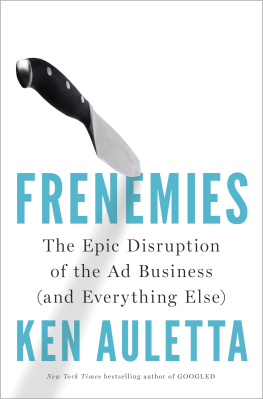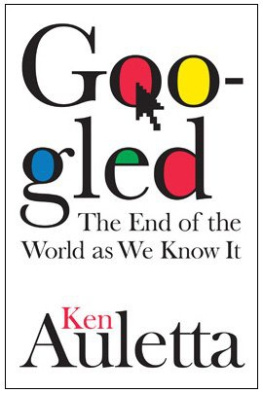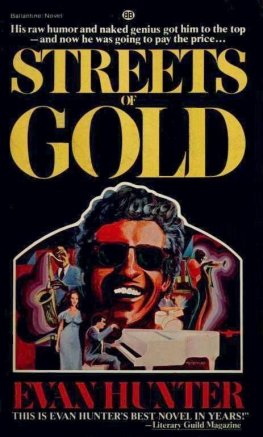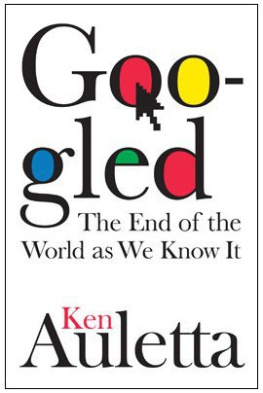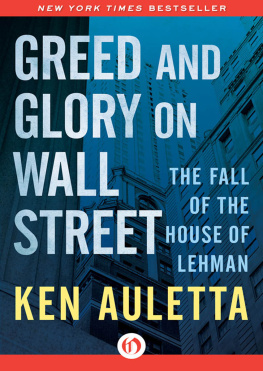Auletta - The Streets Were Paved with Gold
Here you can read online Auletta - The Streets Were Paved with Gold full text of the book (entire story) in english for free. Download pdf and epub, get meaning, cover and reviews about this ebook. year: 2011, publisher: Knopf Doubleday Publishing Group, genre: Politics. Description of the work, (preface) as well as reviews are available. Best literature library LitArk.com created for fans of good reading and offers a wide selection of genres:
Romance novel
Science fiction
Adventure
Detective
Science
History
Home and family
Prose
Art
Politics
Computer
Non-fiction
Religion
Business
Children
Humor
Choose a favorite category and find really read worthwhile books. Enjoy immersion in the world of imagination, feel the emotions of the characters or learn something new for yourself, make an fascinating discovery.

The Streets Were Paved with Gold: summary, description and annotation
We offer to read an annotation, description, summary or preface (depends on what the author of the book "The Streets Were Paved with Gold" wrote himself). If you haven't found the necessary information about the book — write in the comments, we will try to find it.
Auletta: author's other books
Who wrote The Streets Were Paved with Gold? Find out the surname, the name of the author of the book and a list of all author's works by series.
The Streets Were Paved with Gold — read online for free the complete book (whole text) full work
Below is the text of the book, divided by pages. System saving the place of the last page read, allows you to conveniently read the book "The Streets Were Paved with Gold" online for free, without having to search again every time where you left off. Put a bookmark, and you can go to the page where you finished reading at any time.
Font size:
Interval:
Bookmark:
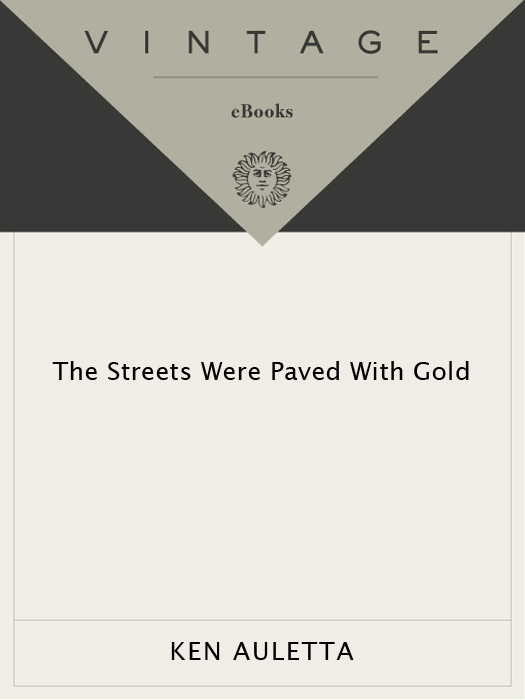
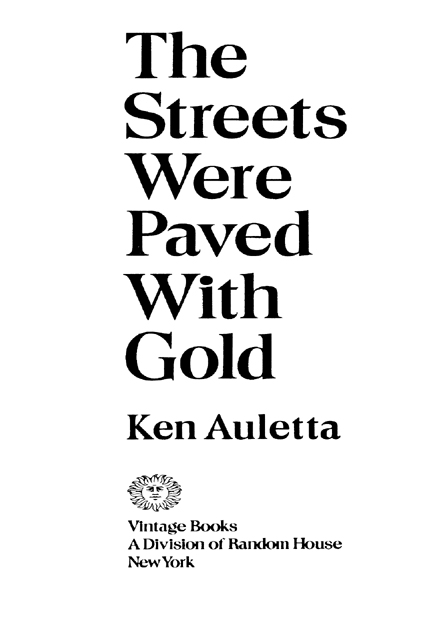
First Vintage Books Edition, March 1980
Copyright 1975, 1976, 1977, 1979 by Ken Auletta
All rights reserved under International and Pan-American
Copyright Conventions.
Published in the United States by Random House, Inc.,
New York, and in Canada by Random
House of Canada Limited, Toronto.
Originally published by Random House, Inc., in March 1979.
Grateful acknowledgment is made to the following for permission to reprint previously published material:
Brookings Institution: Excerpt from Richard P. Nathan and Paul R. Dommel, The Cities, in Joseph A. Pechman, ed., Setting National Priorities: The 1978 Budget, (Brookings Institution, 1977), .
Harper & Row, Publishers, Inc.: Abridged excerpt from of Here Is New York in Essays of E. B. White (1977) by E. B. White. Copyright 1949 by E. B. White. Reprinted by permission of Harper & Row, Publishers, Inc.
New England Economic Review: Excerpt from Lynn Browne and Richard Syron, New England Economic Review, July/August 1977, .
More for Less appeared originally in The New Yorker.
Profile of Abe Beame by Ken Auletta is reprinted courtesy of The New York Times. 1975 by The New York Times Company. Reprinted by permission.
How the Lies of New Yorks Political Midgets Are Destroying the City, After the Storm, the Hurricane, and What Its Like to Be Dead: A Report from City Hall are reprinted by permission of The Village Voice. The Village Voice, Inc., 1975.
Library of Congress Cataloging in Publication Data
Auletta, Ken.
The streets were paved with gold.
1. New York (City)Economic conditions. 2. Finance, PublicNew York (City) 3. New York (City)Politics and government1951- I. Title. HC108.N7A9 1980 336.7471 7922305
eISBN: 978-0-307-80071-8
v3.1
For Nettie
and Pat Auletta
I HAPPEN TO HAVE one of the worlds great jobs. As a journalist, people pay me to meet people, travel, get an education, get my name in the papers, have fun. Journalism is prolonged adolescence.
Writing a book is not as much fun. But you get to work with nice people, some of whom Id like to thank. My close friend, Richard Reeves, goaded me to write this book and painstakingly reviewed the manuscript. When his legs go, Reeves will make a luminous editor. Ray Horton, Howard Samuels, George Sternlieb, Steve Clifford, Dick Ravitch and my agent, Esther Newberg, also took time to read the book and offer valuable suggestions. Mimi Gurbst charitably assisted with fact-checking, as did Mary Schoonmaker. Tully Plesser suggested the books title. Mike ONeill, editor of the New York Daily News, generously extended my leave of absence with greater frequency than Abe Beame amended his budget deficits. Random House is my publisher because I was eager to work with Jason Epstein, an educated man. I was not disappointed. His assistant, Sara Binder, was of great help, as was copy editor Lynn Strong.
Obviously, any blame for this book is mine. If there be any credit, I would like to share it with someone who had a profound effect on my thinking about New YorkHoward Samuels. I had the good fortune to work for Howard on and off from 1965 through 1974. In between helping him lose three gubernatorial campaigns, I listened and learned a lot. He is one of the few liberals I have known who knew how to read a budget. As early as the mid-sixties, he was warning of the citys gathering fiscal crisis, of the budget gimmicks, the collapse of New Yorks economy. At a time when many of us measured the size of a candidates heart, Samuels was presciently measuring the institutional rot of our governmentstheir mismanagement, musclebound civil service system, the too-pervasive power of special-interest groups. From the voters, Howard never received the recognition he deserved. From me, he receives both recognition and thanks.
And, finally, I wish to thank Amanda, who spent the better part of a year staring at my back as I pounded away at the typewriter. During that time, she provided equal measures of constructive criticism and love.
The Rotting Apple
The Causes of New Yorks Fiscal Crisis
Is Anyone Responsible?
Is Washington to Blame?
Mismanaged New York
Is New York Unique?
The Failure of Democracy
Politics: The Melody of the Fiscal Crisis
New York: Liberalisms Vietnam
197578: The More Things Change, the More They Stay the Same
A TRIP TO PARIS inspired this book about New York. Walking with a friend along the sun-drenched Seine, stopping to watch boats gently paddle by, passing the majestic Louvre, the hooded outdoor cafs brimming with relaxed, beautiful women, the tiny shops stuffed with treats and treasuressomehow my thoughts drifted back to New York. Not to the gloomy New Yorkthe fiscal crisis, which I had covered since early 1975, the lost jobs, the slumsbut to New Yorks treasures: the meadows and gently rolling hills of Central and Prospect parks; the postcard-perfect Manhattan skyline glimpsed from the Promenade in Brooklyn Heights; the calzone and other Italian treats of Arthur Avenue in the Bronx, the cornucopia of treats along Fifth Avenue in Manhattan. It was hot in land-locked Paris; hotter than it normally was in Coney Island, where I grew up, and where the roar of the ocean made the hum of the air conditioner superfluous.
The daydream terminated when my friend abruptly asked, When are you going to stop covering a local story and start covering some big national stories? Werent New Yorks fiscal woes so advanced as to be hopeless? Wasnt I bored?
No, I wasnt bored.
No, my continuing anger suggested that I really didnt believe New York was hopeless.
Besides, New York was the big story. Maybe it would take a book to convey that. Maybe a detailed probe of New Yorks difficulties could communicate not just what went wrong here, and why, but what was going wrong in other older cities. Maybe it could illuminate some national, even universal questions: the decline of aging cities; the reasons for the rising taxpayer revolt; the inherent conflict between democracys social goals and its economic system, between organized special-interest groups and the broader public interest. You cant get anything through the state legislature in an election year that the unions dont want, Mayor Ed Koch told me in June 1978. I dont want to paint with a broad brush and say the legislators are in the pocketsin every caseof the union leaders. If they were as honest, the mayor of Atlanta might say the same thing about the Chamber of Commerce, the mayor of Houston about the oil companies, the President of the United States about the arbitrary power of Senator Russell Long, Chairman of the potent Finance Committee. New Yorks crisis, I thought, tells us about the breakdown of democracy, about politics, greed, bureaucracy, cowardice, the failure of good intentions. About how democratic government does not know how to cope with decline. No, long after we have forgotten the name of the Secretary of HEW or Jimmy Carters shifting poll ratings, these questions about the nature of government and democracy will haunt us.
Font size:
Interval:
Bookmark:
Similar books «The Streets Were Paved with Gold»
Look at similar books to The Streets Were Paved with Gold. We have selected literature similar in name and meaning in the hope of providing readers with more options to find new, interesting, not yet read works.
Discussion, reviews of the book The Streets Were Paved with Gold and just readers' own opinions. Leave your comments, write what you think about the work, its meaning or the main characters. Specify what exactly you liked and what you didn't like, and why you think so.

